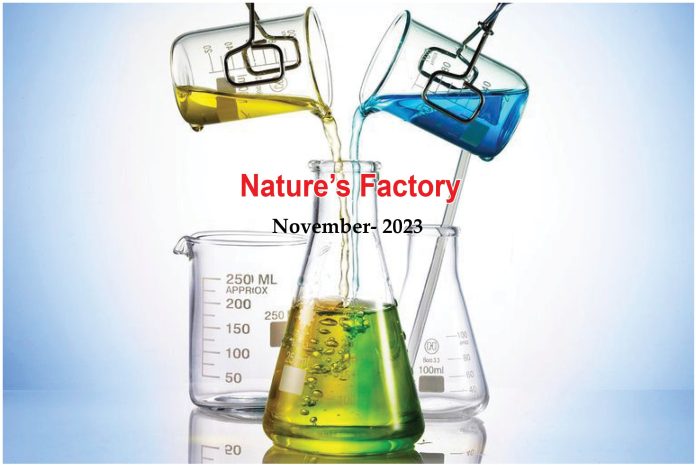The use of plant extracts as intermediaries in the synthesis of chemicals has given a new twist to the term – Chemical Plant. Phytochemicals sourced from plants are emerging as excellent reducing and stabilising agents in the synthesis of nanoparticles. Riding on numerous success stories, plant-mediated synthesis of chemicals offers a sustainable way forward to the industry.
Nature’s Factory
Plant-mediated chemical synthesis is a fascinating and rapidly growing field that harnesses the biochemical capabilities of plants to facilitate the synthesis of various chemicals, especially nanoparticles. This green and sustainable approach capitalises on the diverse array of secondary metabolites, enzymes, and other biomolecules present in plants.
Principles
The fundamental principle of plant-mediated chemical synthesis lies in utilising the inherent biochemical processes of plants to produce desired compounds. Plants are rich sources of secondary metabolites, including alkaloids, flavonoids, terpenes, and phenolics, which have well-established roles in their defence mechanisms and signalling pathways. These compounds often possess unique chemical structures and exhibit various biological activities. The synthesis process typically involves the interaction of plant extracts with precursor chemicals. Various plant parts, such as leaves, stems, roots, and fruits, can be employed depending on the target compound. The active components in the plant extract act as reducing, stabilising, or capping agents during the synthesis of diverse products.
History
The use of plant materials as a reducing agent for different metal ions dates to the early 1900s. However, the precise mechanism of action and the agent responsible for this reduction remained enigmatic during that era. Despite the lack of clarity, the appeal of plant materials as a facile and effective reducing agent garnered attention, especially gaining prominence in recent decades. Plant-mediated methods have proven to proceed via the rapid intra or extracellular processes.
Phytochemicals, such as terpenes, alkaloids, saponins, phenols, and alcohols inherent in plant materials, orchestrate the reduction processes of diverse metal salts. These phytochemicals, distributed across various plant parts like flowers, fruits, stems, leaves, and roots, have spurred numerous reports on the synthesis of metal-based nanoparticles through plant-mediated pathways.
Factors that have been reported to affect the preparation and properties of the prepared nanoparticles include the type of plant extract used, its concentration, the pH of the medium, the concentration of the metal salt, contact time, and temperature. Generally, the method involves the mixing of the extract of interest with an aqueous solution of the metal salt at room temperature. Although different temperatures have been reported, many nanoparticles have been successfully prepared at room temperature underscoring the simplicity and versatility of the plant-mediated synthesis approach.
Plant Parts
Leaves are commonly used for the synthesis of nanoparticles and organic compounds. Their high content of secondary metabolites makes them effective in mediating chemical reactions. Roots, with their unique biochemical composition, are employed for the synthesis of compounds with medicinal and pharmaceutical values. Plant stems, which often contain vascular tissues and secondary metabolites, are utilised for the synthesis of various chemicals and nanoparticles. Fruits, rich in vitamins, antioxidants, and other bioactive compounds, are being explored for the synthesis of materials with applications in the food and cosmetic industries. Utilising extracts from the entire plant offers a holistic approach, to incorporate a diverse range of biomolecules for the purpose of chemical synthesis.
Applications
The applications of plant-mediated chemical synthesis traverse diverse fields. In the realm of nanotechnology, this synthesis methodology stands out as a prolific producer of nanoparticles. Gold, silver, and metal oxide nanoparticles, born from the green embrace of plant extracts, find applications in catalysis, medicine, and electronics. The pharmaceutical arena reaps benefits as bioactive compounds derived from plant-mediated synthesis pave the way for anti-cancer agents, antibiotics, and therapeutic compounds. Nature’s pharmacy, unlocked through plant synthesis, holds promise for novel drug discoveries.
Cosmetics and personal care industries are not left untouched. The cosmetic palette is expanding with plant-derived dyes, fragrances, and antimicrobial agents, responding to the growing demand for sustainable and natural ingredients. Environmental remediation benefits from plant-mediated synthesis, as materials are crafted to remove pollutants and heavy metals from water and soil, contributing to a cleaner and healthier planet. In agriculture, the synthesis of bio-pesticides, herbicides, and plant growth-promoting materials emerges as a potential game-changer, aligning agricultural practices with sustainable and eco-friendly principles.
Advantages
One of the key advantages is the eco-friendly nature of plant-mediated synthesis. It reduces the reliance on traditional chemical synthesis methods that often involve hazardous reagents and by-products. Products obtained through plant-mediated synthesis are often biocompatible and suitable for biomedical applications. This is particularly crucial in the synthesis of materials for drug delivery and medical imaging. Utilising plant resources aligns with sustainable practices. Plants can be cultivated and harvested in a controlled manner, ensuring a continuous and sustainable source of raw materials. Plant-mediated synthesis can be cost-effective, especially when considering the scalability and ease of cultivation of many plant species. The vast array of secondary metabolites in plants allows for the synthesis of diverse compounds, expanding the potential applications of this approach.
Success Stories
Some success stories involve the synthesis of anticancer compounds using plant-mediated approaches. Certain plant extracts have been found to facilitate the synthesis of bioactive compounds with potential anticancer properties, opening up new avenues for drug discovery. Extracts from neem, a tree with myriad medicinal properties, have been utilised for the synthesis of silver nanoparticles. The phytochemicals in neem leaves serve as reducing and stabilising agents, resulting in the formation of silver nanoparticles with antimicrobial properties. Green tea extracts have been employed for the green synthesis of iron nanoparticles. The catechins present in green tea act as reducing agents, facilitating the formation of iron nanoparticles. These nanoparticles have shown promise in environmental remediation for the removal of heavy metals from water. Banana peel extract has been employed for the biogenic synthesis of palladium nanoparticles. The phenolic compounds in banana peel act as reducing agents, leading to the formation of palladium nanoparticles. These nanoparticles have shown catalytic activity in various chemical reactions.
Road Ahead
The path to harnessing nature’s synthesis capabilities is not without hurdles. Standardisation of plant-mediated synthesis is a formidable challenge due to the variability in plant species, growth conditions, and extraction procedures. A unified protocol is essential for reproducibility. Optimising processes for large-scale production is another obstacle, requiring a delicate balance between maintaining the eco-friendly essence and meeting industrial demands. Understanding the underlying mechanisms is an ongoing pursuit. Unlocking the secrets of plant-mediated synthesis will empower researchers to design processes more rationally and develop new materials. Bridging the gap between research laboratories and industrial applications is imperative for widespread adoption. Integration into industries will be the litmus test for the practicality and efficiency of plant-mediated synthesis. Exploration of novel plant species with unique biochemical profiles holds the promise of discovering hitherto unknown compounds, expanding the canvas of possibilities.
Epilogue
Plant-mediated chemical synthesis stands at the intersection of biology and chemistry, offering a sustainable and versatile approach for the production of a wide range of compounds. With ongoing research, standardisation efforts, and advancements in technology, plant-mediated synthesis holds the promise of transforming the chemical industry and contributing to a more sustainable future.
































